Did you know you can access previous editions of the policy update online here? You can also find them on the BU research blog by searching on the “policy” category, although that is often a shorter version without the pictures.
Local elections
If you are reading this on Friday, the results are still being announced. The main headline at the time of writing is that the Conservatives and Labour have been hit by a Brexit backlash – interestingly there is a contradiction between the view that people are fed up with the two main parties for bodging Brexit – and the fact that they seem to have voted for the Lib Dems instead. Which would be odd, but of course it probably isn’t as simple as that.
With the Brexit party not standing, UKIP having swung perhaps too far to the right for those ex-Conservatives who have voted for them recently, and Labour holding their vague line on Brexit, leave voters may have had nowhere to go and may have stayed at home, while fed up remainers have turned out and voted Lib Dem. As turn-out is apparently close to the last time, despite predictions it would be low, that doesn’t seem to stand up.
The Lib Dems were previously the party of local politics, especially in the South West. Perhaps the swing back to them is just about local issues. Or, maybe they have just recovered their national position after their post-coalition drubbing, as former Lib Dem voters have finally forgiven them.
And the much shouted about swing to independents may not be all it seems either. We reviewed the candidates for the Bournemouth, Poole and Christchurch election and found that a proportion of the independents had previously been Conservative or UKIP councillors or candidates. So despite the potentially attractive image of a set of independent minded councillors who will change local politics, they may be the same people who are fed up with their former party for a range of reasons – national or local (perhaps opposed to the council merger for BCP) – and will therefore not advocate radical change if elected. We’ll see.
All in all, while there will be a lot of handwringing and speculation, in the end there is no one story here. A clearer view of the state of the nation might emerge from the EU votes, although they are likely to pull out the protest votes – people may vote for parties that they would never vote for in a general or even a local election just to make a point (especially as these appointments are likely to be short term and leave voters are fed up at having the elections at all). And turn out in the EU elections may be spectacularly low for the same reason.
Local results:
Brexit goes missing
There is very little news on Brexit. The government seem to have stopped pretending that the deal will be approved in time to stop the EU elections, the government/Labour party compromise discussions seem to be going nowhere and it has all gone very quiet. No-one even asked the PM about it in PMQs. At some point someone will have to do something if they don’t want a no deal Brexit by default in October, but there seems to be no hope of a breakthrough or plan to achieve one. It’s strange that we have gone so quickly from the chaos a parliamentary takeover and daily mini-crises to hopeless inaction. And it really shows the importance of a deadline in politics. Without one, they seem unable to do anything. Perhaps they have just been distracted by the local elections, but it doesn’t seem likely. Or perhaps everyone is waiting for someone else to find a solution.
Contextual Admissions
The OfS have published Contextual admissions – promoting fairness and rethinking merit challenging the sector ‘to be ambitious and innovative in reducing persistent inequalities in access and participation.’ They go on: ‘Contextual admissions are one way of doing this, but a more radical approach is needed if we are to achieve fair access.’… ‘In parts of the sector, good progress has been made in recruiting disadvantaged students. Overall, however, analysis shows that contextual admissions have not yet had a significant impact on fair access to higher education.’
Key points:
- While there has been some progress as a result of the increased use of contextual offers, gaps in equality of access between the most and least advantaged groups remain wide. Universities need to rethink how they are judging merit, rather than focusing narrowly on school exam success alone. A more radical use of contextual admissions is one way to achieve this conceptual shift.
- Through reforming access and participation plans the OfS will instigate more honest self-assessment, more ambitious targets, more evidence-based measures and better evaluation. Each university will need to demonstrate how it will make progress to reduce its access gaps, including where appropriate the use of contextual admissions.
- Alongside the government, the OfS will continue to work to persuade league table providers to use measures that do not penalise contextual admissions.
- The OfS will encourage providers to evaluate their approaches rigorously and to share widely their approaches to admissions, including through the new ‘what works’ centre, the Centre for Transforming Access and Student Outcomes in Higher Education and the A to Z guidance on effective practice.
The University of Bristol is included as a case study and OfS praise the ‘evolving approach’ at Bristol since 2009. Accepted students are automatically offered a lower grade if they attend a state school in the bottom 40 per cent for attainment, live in POLAR3 quintiles 1 or 2, have completed a University of Bristol outreach event, or have spent time in care. Although the students are not offered any additional targeted support once admitted, research has shown that students admitted to Bristol with one grade lower than the entry requirements do just as well as, if not better than, those admitted on the standard offer.
The publication concludes: The OfS has high expectations of universities and colleges to reduce equality gaps in relation to access and participation. Through our reforms to regulating access and participation, we are giving them the time and flexibility to be more ambitious and to innovate.
Read more on the OfS’ expectations and other case studies here.
BAME attainment
Universities UK and NUS have co-published a report on BAME attainment at Universities. It covers how a student’s race and ethnicity can significantly affect their degree outcomes highlighting that the biggest gap is that between white student and students from Black, Asian or minority ethnic (BAME) backgrounds getting a ‘good degree’ (first- or upper-second-class degree) at 13% in 2017–18 graduates. It calls on the sector to partner meaningfully with students and robustly demonstrate commitment to addressing the BAME attainment gap.
Key Recommendations:
- The Office for Students, (OfS) Evidence and Impact Exchange should systematically review ‘what works’ (as well as what does not) as a priority, to inform universities’ investment and strategies to address the attainment gap.
- The government’s Race Disparity Audit should consider how it can support different parts of UK civil society – including universities – that are addressing similar, structural inequalities, and draw together evidence on how different types of organisations have achieved success.
- Universities should raise greater awareness amongst staff of how to support BAME students, gain greater insight into BAME students’ perceptions, and ensure practices and initiatives on this issue reflect varied experiences and needs.
Read more here.
Amatey Doku, Vice President Higher Education, National Union of Students, said: I ask university leaders, from whom strong leadership on these issues is essential, not to treat the BAME attainment gap as a numbers game. Data analytics and targets will be critical to ensuring that there is accountability and transparency, but we must never lose sight of the fact that we are dealing with the lives of individuals who face systematic discrimination from all parts of society.
Social Mobility
The Social Mobility Commission (restarted last year after all its members resigned) have published the State of the Nation 2018-19: Social Mobility in Great Britain report stating inequality is now entrenched in Britain from birth to work, and calling on the Government to take urgent action to help close the privilege gap. The report looks at early childhood, schools, FE, universities, and work to reiterate familiar messages that social mobility has stagnated for the last 4 years. The report analyses Office for National Statistics (ONS) data to show the wide gap in school attainment and income between the rich and the poor has barely shifted, with the financially better off nearly 80% more likely to end up in professional jobs than those from a working-class background. Other findings include:
- People from more affluent backgrounds are 70% more likely to move region than those from working class backgrounds and are three times more likely to move to London
- The class pay gap: those from working class backgrounds earn 24% less a year than those from professional backgrounds. Even when those from working-class backgrounds are successful in entering professional occupations, they earn on average 17% less than their more privileged colleagues.
- Living standards: there are now 500,000 more children in poverty than in 2012. Those from working class backgrounds are less likely to own a home than those from more privileged backgrounds. Young people are less likely to own a home, and typically earn less than in previous generations.
To help address this inequality, the commission calls on the government to:
- extend eligibility and uptake of the 30 hour childcare offer to those only working 8 hours a week, as a first step to make it available to more low-income families
- raise per pupil funding by a significant amount for those aged 16 to 19, and introduce a new pupil premium for disadvantaged students in that age group
- become an accredited voluntary living wage employer so that government departments pay the voluntary living wage to civil servants and all contracted workers including cleaning and catering staff
Dame Martina Milburn, chair of the commission, said: “Our research suggests that being able to move regions is a key factor in being able to access professional jobs. Clearly moving out is too often necessary to move up. At a time when our country needs to be highly productive and able to carve out a new role in a shifting political and economic landscape, we must find a way to maximise the talent of all our citizens, especially those that start the furthest behind.”
Matthew Fell, CBI Chief UK Policy Director, said: “Social mobility is fundamental to people feeling that the economy is working for them. Most companies understand their responsibilities and want to do even more to support the next generation of talented people from all backgrounds. Companies succeed when they embrace life-long learning and work with schools and colleges to give young people the best start in life. That’s why the Government must end the financial neglect of England’s further education system and carefully consider this recommendation as part of its Spending Review.”
EU tuition fees post-Brexit
Over the weekend BuzzFeed leaked plans suggesting the Government is considering an increase in tuition fees and ending EU financial support. The government has previously confirmed that all EU students starting courses in the UK in the 2019/20 academic year are eligible for student finance and will be treated as “home” students for fee purposes – regardless of whether the UK leaves the EU with a deal or not. Scotland has recently extended their own guarantee to students starting in September 2020. The UK government has not confirmed what will happen in the 2020/21 academic year. It was always expected that – unless a post-Brexit deal is done with the EU which includes an ongoing arrangement about EU student finance – at some point the UK government would stop requiring universities to treat them as home students and stop providing student finance.
So what would happen then? The absence of student loans would probably impact the number of EU students coming to the UK, but also the demographic of those students who do come – like international students now, EU students would have to find their own fees. They do not usually qualify for maintenance loans (unless they have been resident in the UK for a number of years).
And what would those fees be? The press articles assume that they would be the same as other international students. It is important to note that the government does not set international student fees, and so a steep rise in tuition fees for EU students is not guaranteed. At the time of the referendum, there was an argument made that it would be anti-competitive for universities to charge (say) US students one fee and EU students something less, in the absence of an agreement between governments. The government has taken its current position unilaterally, as has the Scottish government, but there could be complaints by non-EU students against individual universities who chose to do the same in the future. One way to mitigate this might be to offer bursaries to EU students, but again, that might be challenged.
The rumours over the weekend suggest that the government is going to announce that their current policy (of extending the guarantee a year at a time) will finally end – perhaps for students starting in 2020 or maybe 2021.
UUK are quoted in the Guardian:
- “It is essential there is no further delay in the UK government confirming the fee status for EU students starting courses at English universities in autumn 2020. The recruitment cycle is already well under way,” a spokesperson for Universities UK said.
- “The ongoing uncertainty is restricting student choice and the ability of English universities to recruit the best students from the EU. Whatever the eventual fee status of EU nationals, universities need at least 18 months’ notice of any change.”
- A DfE spokesperson said: “Last year, we announced that students from the EU starting courses in England in the 2019-20 academic year will continue to be eligible for home fee status, which means they will be charged the same tuition fees as UK students.
- “The government will provide sufficient notice for prospective EU students on fee arrangements ahead of the 2020-21 academic year and subsequent years in the future.”
And what about the impact? You may remember at the time of the referendum there was a big argument about whether EU students repay their loans – the suggestion being that this was a huge hidden contribution that the UK was making to EU citizens. The SLC brought out a repayment strategy to address this.
HESA have the data about where EU students come from but it’s in rather more digestible form from the Complete University Guide here. One possibility as noted above is that the overall numbers of non UK students may not fall or at least not drop off completely, but that the demographic might change, so that we will see fewer EU students from less wealthy backgrounds.
Parliamentary debate
On Monday the Opposition tabled an urgent question on EU tuition fees. Universities Minister Chris Skidmore said no decision had been made yet but that the Government would provide enough notice for 2020/21 applicants. The Opposition also questioned the Government’s International Education Strategy expansion plans (more on this below), the Minister explained the need to attract HE students from all corners of the globe and think beyond EU residents. Carol Monaghan, SNP Shadow Education Secretary, highlighted that despite Scotland’s continuation of free tuition for EU students they anticipate a drop in EU demand because the “European temporary leave to remain scheme will not suit many courses”. She also asked when the post-study work scheme would be reintroduced for international students (EU and globally). The Minister said the immigration white paper would tackle this issue and reminded that postgraduate fees were separate from this discussion of EU undergraduate fees and that the Government “do not want to do anything that will damage the potential of UK universities to research and continue with their research partnerships”. The post-study work issue was raised again in light of the length and greater expense of medical and dental degrees highlighting that the lack of opportunity to work in the UK after completion was hurting recruitment. Skidmore acknowledged this was particularly an issue for the Scottish Universities. Politics Home ran an article quoting Jo Johnson as in favour of the post-study work visa: Britain [is] missing out on billions of pounds, and losing top talent to other countries, by limiting their post-study stay to just four months.
Former Universities Minister, Sam Gyimah, took part in the debate stating: “whilst no decision has yet been made on this specific policy, the cumulative impact of some our policy decisions, whether it’s the immigration cap, which would make it more difficult for researchers from abroad to come and work and study here, whether its policy which would hike up fees for EU students or lack of clarity on Erasmus, the cumulative effect could be that we are undermining the university sector.”
Speaking outside of the debate previous Education Secretary Justine Greening also criticised the proposal to end EU fee remission: “As one company put it to me recently, Britain is in a talent war. We won’t be successful in that if we put up more barriers to encouraging talent, from home or abroad.”
During the urgent question debate Vicky Ford MP alluded to a recent agreement between the EU27 and UK on future cooperation in science, innovation, youth, culture and education, calling for “fair and appropriate financial contribution”. She encouraged members to vote for the Government’s withdrawal agreement to guarantee such a future relationship. Chris Skidmore agreed stating that the UK does disproportionately well out of scientific grants from the EU and confirmed that he would attend the EU Competitiveness Council meeting on 28th May.
There was some to and fro over whether subsiding EU students to study in Britain prevented students coming from elsewhere, particularly developing countries.
Chris Skidmore’s tone was on the whole supportive and positive of the contribution that Universities make. In conclusion to the urgent question discussion he said: “we have provided the certainty on 2019-20, and an announcement on 2020-21 will be made shortly. Any future policies will be part of those future negotiations, which, if we can have the EU deal voted through by the House, we will be able to get on with”.
Post-18 Review – policy options
The Education Policy Institute have published a report examining the evidence on various policy options for the Government ahead of the Augar Review. The report scrutinises policy proposals on tuition fees, student support, and non-HE funding; it outlines the evidence for each policy option, before setting out recommendations on how the government should proceed.
Key Findings:
- Proposals from the government and opposition parties to reduce or abolish tuition fees, or lower interest rates, would have a regressive impact. Most of the high profile options for reform would benefit higher earners, and have little impact on improving education access or quality.
- To help address inequities between higher and further education funding, maintenance loans should be extended to 19-23 year olds pursuing vocational, level 3 qualifications. The government should offer more financial support to those pursuing study outside of higher education. Currently, vocational learners are not entitled to maintenance loans.
- The government should avoid a system in which tuition fees vary by subject or university. Varying fees by subject to steer students toward high demand courses has been ineffective when applied in other countries, with demand largely unresponsive to changes in price. Varying fees by institution may entrench inequality. Rewarding high graduate returns with extra funding may penalise institutions with high proportions of disadvantaged students.
- Imposing a minimum academic standard to access university loans – a ‘UCAS tariff floor’ – should not be introduced without strong evidence that the majority of those denied loans would be better off pursuing other education routes.
You can read the full detail here.
Rt Hon David Laws, Executive Chairman, EPI said: Many of the most widely discussed policy options would be likely to have little or no impact on participation or education quality, and higher earning graduates would often be the major gainers from reform – even though it is arguable that in education terms they are not the obvious priority at a time when difficult public spending choices are necessary.
International Expansion
Education Secretary Damian Hinds delivered a speech on the Government’s International Education Strategy (published in March). He confirmed that the strategy aims to increase the number of international higher education students to 600,000 by 2030. Hinds said:
In higher education we are still gaining volume, but we are losing share, as we have grown around 5% from 435,000 students in 2013/14 to 458,000 in 2017/18. We do have quite a reliance on one source market – albeit a very big one: China. We should look to develop both existing markets but to diversify and develop new and sustainable opportunities too, for example continuing to grow the Indian market, and countries from South East Asia and Africa too.
We need to talk about Education Technology too. This is a flourishing business sector for the UK, with a steadily growing export market. We know that domestic market development and export success are closely linked, so we will support UK EdTech businesses in both.
Specifically, this means:
- defining 10 new “EdTech challenges” to galvanise industry action on some real-world issues faced by the education sector where technology has strong potential to drive progress;
- helping to forge new connections between technology innovators and their users, through the creation of testbed schools and colleges; and
- supporting more effective procurement practice for both suppliers and users. For example, through support for BESA’s LendED platforms – a try-before-you-buy service linking EdTech companies and educators.
It has never been more important for us to be globally-minded, outward looking and ambitious. The competition has never been fiercer. But the opportunities have never been greater. They are there to be taken.
Consultations
Click here to view the updated consultation tracker. Email us on policy@bournemouth.ac.uk if you’d like to contribute to any of the current consultations.
Other news
Food for thought: Results of two interesting national polls:
Schools – Ofsted positivity: Ofsted published their fourth annual parents survey which explores parents’ awareness and perceptions of the regulator and is used to feed into Ofsted’s strategic priorities. Key points:
- 68% of parents agreed that Ofsted is a valuable source of information about education within the local area
- 68% believe Ofsted’s work helps to improve standards of education (this was a statistically significant increase compared to the previous year results)
- 65% agreed that Ofsted provides a reliable measure of a schools quality (statistically significant increase)
- 65% of parents agree that Ofsted is a valuable source of information about childcare in local areas
- 9 out of 10 (89%) parents know the Ofsted rating of their child’s childcare provider or school.
- Parents are most likely to feel ‘core’ subjects of Maths, English and Science are sufficiently covered in their child’s education. However, 4 in 10 parents or less feel that subjects such as Art, Music, Languages and D&T are sufficiently covered
- Three quarters of parents feel Ofsted is a reliable source of information and there has been a drop in parents who feel their judgements are unreliable (down 3% to 16%). However, some parents were concerned that the Ofsted reports didn’t provide an accurate representation of what that school is like, and some felt the reports were pointless as they would be sending their child to that school anyway.
Read more or delve deeper into the pretty charts representing the data from page 11 onwards.
Disinformation Committee: Fake news and disinformation continue to be of importance to the public so the Digital, Culture, Media and Sport Committee are launching a new sub-committee on Disinformation:
- We believe that there is a public interest in continuing our examination of the continuing threat posed by disinformation to democracies.
- In order to do this, we are forming a new Sub-Committee on Disinformation. We are launching a new website and will hold evidence sessions in May 2019 with the Secretary of State for Digital, Culture, Media and Sport, Rt Hon Jeremy Wright QC MP, and with the Information Commissioner, Elizabeth Denham. Among other issues, we will discuss with them the Government’s response to our report on ‘Disinformation and ‘Fake News’’, and the White Paper on Online Harms, due to be published shortly.
- …we plan to make use of the new Standing Order enabling us to invite members of any other select committee to attend any meeting of the Sub-Committee to ask questions of witnesses. In this way, the Sub-Committee will become Parliament’s ‘institutional home’ for matters concerning disinformation and data privacy; a focal point that will bring together those seeking to scrutinise and examine this threat to democracy.
- In launching this Sub-Committee, we are creating a standing programme of work. It signals our commitment to continuing our rigorous scrutiny of democratic accountability, and to play our part in protecting individuals from the insidious onslaught of disinformation and digital disruption. We look forward to continuing the highly important work that we have begun.
School work experience: Founders4schools and LKMco have published a joint report on young people and work experience, focussed upon making work experience fit for purpose. This highlights that the quality of work experience is hugely variable, and often very poor. A large proportion of young people do not think the work experience they undertake is good quality. However the quality is likely to be higher for more affluent pupils, who have access to stronger, higher-status networks relevant to their needs and aspirations. Key points:
- Many young people do not have access at all. Survey data indicates that half of young people aged 14- to 25-years-old have not participated in work experience.
- Demographic characteristics affect access to work experience opportunities. Poverty, minority ethnic status, gender and special educational need or disabilities all reduce pupils’ likelihood of participating.
- Access is also affected by subject choices. Pupils choosing ‘academic’ routes in school are less likely to participate in work experience. In addition, work experience is more readily available in certain sectors and organisations than others.
Carolyn Fairbairn, Director-General, CBI said: “… young people who have at least four interactions with business at school are five times less likely to be unemployed as an adult, with early exposure to business – whether through work experience, internships, mentoring or career talks – helping young people to feel better prepared.”
Ed Tech investment: The Australian SEEK Group have invested £50 million to half own the FutureLearn social learning platform in partnership with the Open University making this it largest ever private-sector EdTech investment in Europe. FutureLearn currently has over 9 million learners.
- OU VC Mary Kellett said: “Our partnership with SEEK and the investment in FutureLearn will take our unique mission to make education open for all into new parts of the world. Education improves lives, communities and economies and is a truly global product, with no tariffs on ideas.”
- The partnership with SEEK will have contractual arrangements in place to protect the University’s academic independence, teaching methods and curriculum.
- SEEK CEO, Andrew Bassat, said: “This investment follows the same logic applied to IDP and Online Education Services ‘OES’ in that we like to invest in disruptive business models that provide world class student education outcomes. Technology is increasing the accessibility of quality education and can help millions of people up-skill and re-skill to adapt to rapidly changing labour markets. We see FutureLearn as a key enabler for education at scale”.
- FutureLearn CEO Simon Nelson said: “This investment allows us to focus on developing more great courses and qualifications that both learners and employers will value. This includes building a portfolio of micro-credentials and broadening our range of flexible, fully online degrees and being able to enhance support for our growing number of international partners to empower them to build credible digital strategies, and in doing so, transform access to education.”
Rankings: The Complete University Guide published its University League Table 2020.
Subscribe!
To subscribe to the weekly policy update simply email policy@bournemouth.ac.uk
JANE FORSTER | SARAH CARTER
Policy Advisor Policy & Public Affairs Officer
Follow: @PolicyBU on Twitter | policy@bournemouth.ac.uk
 Yesterday ResearchGate announced that the paper ‘Academic authorship: who, why and in what order?’ [1] has been read 1000 times. The paper addresses two related issues in academic writing: (a) authorship; and (b) order of authors. The issue of authorship centres on the notion of who can be an author, who should be an author and who definitely should not be an author. The paper reminds the reader that this is partly discipline specific. The second issue, the order of authors, is usually dictated by the academic tradition from which the work comes. One can immediately envisage disagreements within a multi-disciplinary team of researchers where members of the team may have different approaches to authorship order. Prof. Vanora Hundley is the lead author and the paper is co-authored with Prof. Edwin van Teijlingen, both in the Centre for Midwifery, Maternal & Perinatal Health (CMMPH), and BU Visiting Professor Padam Simkhada. Padam is Professor of International Public Health in the Public Health Institute at Liverpool John Moores University.
Yesterday ResearchGate announced that the paper ‘Academic authorship: who, why and in what order?’ [1] has been read 1000 times. The paper addresses two related issues in academic writing: (a) authorship; and (b) order of authors. The issue of authorship centres on the notion of who can be an author, who should be an author and who definitely should not be an author. The paper reminds the reader that this is partly discipline specific. The second issue, the order of authors, is usually dictated by the academic tradition from which the work comes. One can immediately envisage disagreements within a multi-disciplinary team of researchers where members of the team may have different approaches to authorship order. Prof. Vanora Hundley is the lead author and the paper is co-authored with Prof. Edwin van Teijlingen, both in the Centre for Midwifery, Maternal & Perinatal Health (CMMPH), and BU Visiting Professor Padam Simkhada. Padam is Professor of International Public Health in the Public Health Institute at Liverpool John Moores University.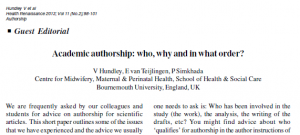
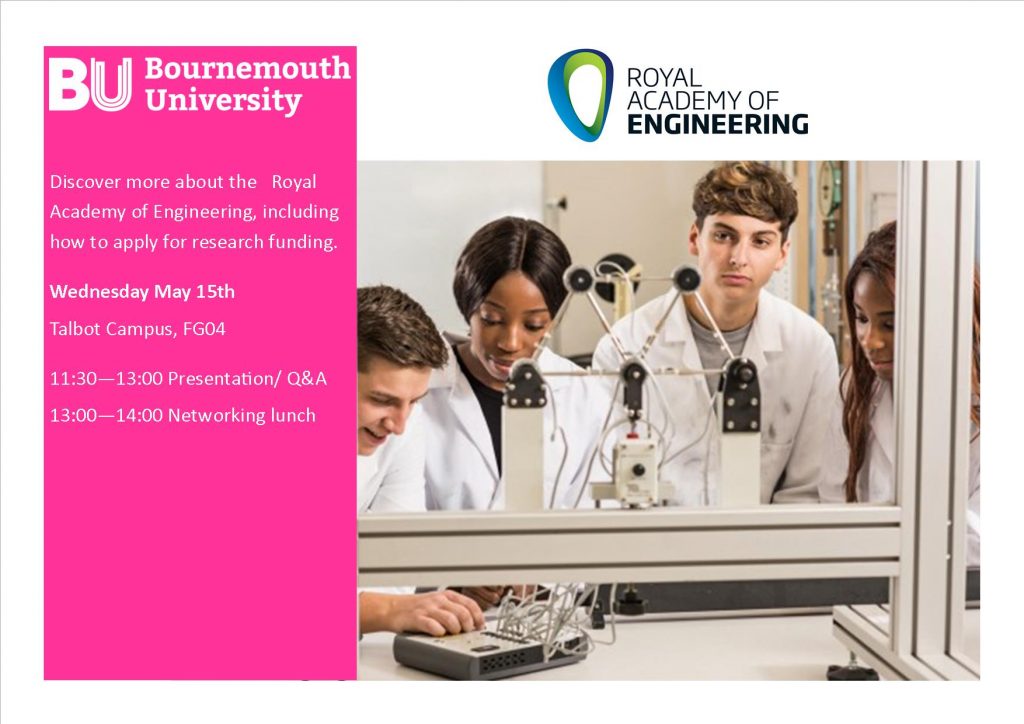 Engineering matters. It underpins our daily lives, drives economic growth, plays a critical role in addressing major societal challenges and helps ensure our readiness for the future, from providing a sustainable supply of food, water and clean energy, to advancing healthcare, and keeping us safe and secure.
Engineering matters. It underpins our daily lives, drives economic growth, plays a critical role in addressing major societal challenges and helps ensure our readiness for the future, from providing a sustainable supply of food, water and clean energy, to advancing healthcare, and keeping us safe and secure.

 Yesterday the Nepal Journal of Epidemiology published its latest issue which included the paper on ‘Post-Traumatic Stress Disorder among the Flood Affected Population in Indian Subcontinent’ [1]. This Short Communication is co-authored by Prof. Edwin van Teijlingen and two members of the Visiting Faculty in our Faculty of Health & Social Sciences, namely: Prof. Padam Simkhada and Dr. Brijesh Sathian. The Nepal Journal of Epidemiology is an Open Access journal hence this paper is freely available for anybody with internet access to read.
Yesterday the Nepal Journal of Epidemiology published its latest issue which included the paper on ‘Post-Traumatic Stress Disorder among the Flood Affected Population in Indian Subcontinent’ [1]. This Short Communication is co-authored by Prof. Edwin van Teijlingen and two members of the Visiting Faculty in our Faculty of Health & Social Sciences, namely: Prof. Padam Simkhada and Dr. Brijesh Sathian. The Nepal Journal of Epidemiology is an Open Access journal hence this paper is freely available for anybody with internet access to read.













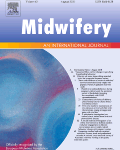
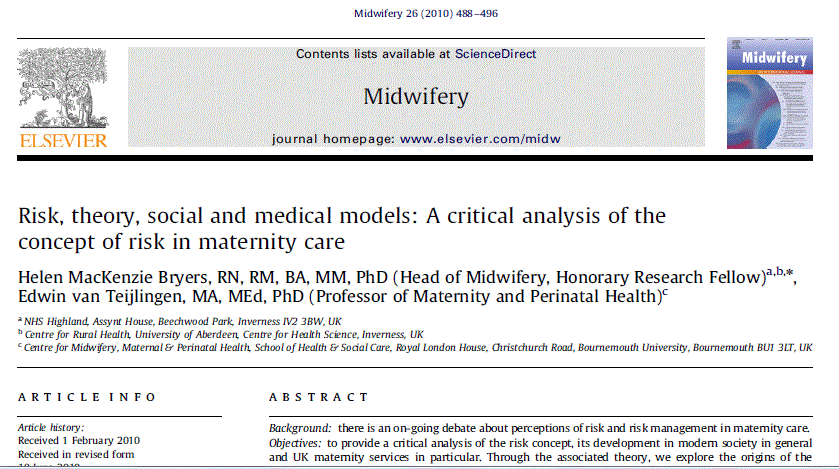
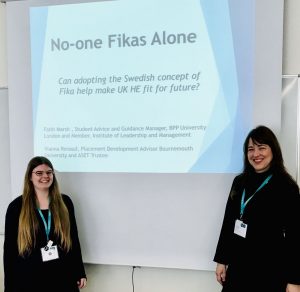 it was a wonderful opportunity to share the key observations and learning gained by my fellow UK delegates during the 2018 AUA Study Trip to Sweden.
it was a wonderful opportunity to share the key observations and learning gained by my fellow UK delegates during the 2018 AUA Study Trip to Sweden. During our conference presentation, my co-presenter Faith Marsh from BPP London and I gave the attendees time to explore at their tables their thoughts on if and how they could foresee implementing a Fika break into their daily patterns. It became very clear that everyone who attended unanimously agreed that whilst a daily break would be frown upon and ultimately impossible, the idea of a weekly or fortnightly staff break would be possible. We discussed how we could all take the initiative forward at our own campuses and given how many of us have been in contact since, we shall see how things progress along the Swedish way!
During our conference presentation, my co-presenter Faith Marsh from BPP London and I gave the attendees time to explore at their tables their thoughts on if and how they could foresee implementing a Fika break into their daily patterns. It became very clear that everyone who attended unanimously agreed that whilst a daily break would be frown upon and ultimately impossible, the idea of a weekly or fortnightly staff break would be possible. We discussed how we could all take the initiative forward at our own campuses and given how many of us have been in contact since, we shall see how things progress along the Swedish way! Speaker: Dr Giuseppe Valenzise
Speaker: Dr Giuseppe Valenzise












 New Nepal scoping review on maternal & neonatal health
New Nepal scoping review on maternal & neonatal health Fourth INRC Symposium: From Clinical Applications to Neuro-Inspired Computation
Fourth INRC Symposium: From Clinical Applications to Neuro-Inspired Computation Writing policy briefs
Writing policy briefs Upholding Excellence: The Concordat to Support Research Integrity
Upholding Excellence: The Concordat to Support Research Integrity ECR Funding Open Call: Research Culture & Community Grant – Application Deadline Friday 12 December
ECR Funding Open Call: Research Culture & Community Grant – Application Deadline Friday 12 December MSCA Postdoctoral Fellowships 2025 Call
MSCA Postdoctoral Fellowships 2025 Call ERC Advanced Grant 2025 Webinar
ERC Advanced Grant 2025 Webinar Horizon Europe Work Programme 2025 Published
Horizon Europe Work Programme 2025 Published Horizon Europe 2025 Work Programme pre-Published
Horizon Europe 2025 Work Programme pre-Published Update on UKRO services
Update on UKRO services European research project exploring use of ‘virtual twins’ to better manage metabolic associated fatty liver disease
European research project exploring use of ‘virtual twins’ to better manage metabolic associated fatty liver disease